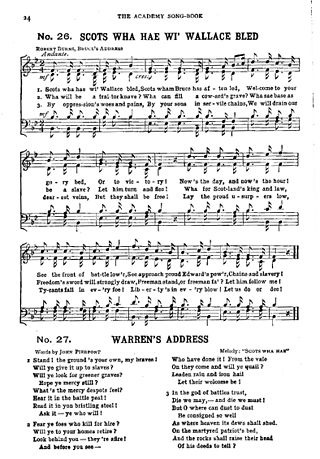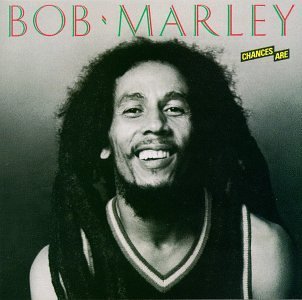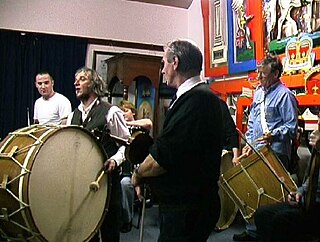
In popular music, a cover version, cover song, remake, revival, or simply cover, is a new performance or recording by a musician other than the original performer or composer of the song. Originally, it referred to a version of a song released around the same time as the original in order to compete with it. Now, it refers to any subsequent version performed after the original.

Dumbarton is a town in West Dunbartonshire, Scotland, on the north bank of the River Clyde where the River Leven flows into the Clyde estuary. In 2006, it had an estimated population of 19,990.

"Auld Lang Syne" is a popular song, particularly in the English-speaking world. Traditionally, it is sung to bid farewell to the old year at the stroke of midnight on New Year's Eve/Hogmanay. By extension, it is also often heard at funerals, graduations, and as a farewell or ending to other occasions; for instance, many branches of the Scouting movement use it to close jamborees and other functions.

GarageBand is a line of digital audio workstations developed by Apple for macOS, iPadOS, and iOS devices that allows users to create music or podcasts. GarageBand was originally released for macOS in 2004 and brought to iOS in 2011. The app’s music and podcast creation system enables users to create multiple tracks with pre-made MIDI keyboards, pre-made loops, an array of various instrumental effects, and voice recordings.

"The Ballad of Chevy Chase" is an English ballad, catalogued as Child Ballad 162. There are two extant ballads under this title, both of which narrate the same story. As ballads existed within oral tradition before being written down, other versions of this once-popular song also may have existed.
Flowers of the Forest, or The Fluuers o the Forest, is a Scottish folk tune and work of war poetry commemorating the defeat of the Scottish army, and the death of James IV, at the Battle of Flodden in September 1513. Although the original words are unknown, the melody was recorded c. 1615–1625 in the John Skene of Halyards Manuscript as "Flowres of the Forrest", although it might have been composed earlier.
A strathspey is a type of dance tune in 4
4 time, featuring dotted rhythms, which in traditional playing are generally somewhat exaggerated rhythmically. Examples of strathspeys are the songs "The Bonnie Banks o' Loch Lomond" and "Coming Through the Rye".

"The Little Drummer Boy" is a popular Christmas song written by American composer Katherine Kennicott Davis in 1941. First recorded in 1951 by the Trapp Family, the song was further popularized by a 1958 recording by the Harry Simeone Chorale; the Simeone version was re-released successfully for several years, and the song has been recorded many times since. In the lyrics, the singer relates how, as a poor young boy, he was summoned by the Magi to the Nativity of Jesus. Without a gift for the Infant, the little drummer boy played his drum with approval from Jesus's mother, Mary, recalling, "I played my best for him" and "He smiled at me".

"Scots Wha Hae" is a patriotic song of Scotland written using both words of the Scots language and English, which served for centuries as an unofficial national anthem of the country, but has lately been largely supplanted by "Scotland the Brave" and "Flower of Scotland".

Southern Culture on the Skids, also sometimes known as SCOTS, is an American rock band from Chapel Hill, North Carolina.

Chances Are is a compilation album by Bob Marley released in 1981 by WEA International throughout the world, and through the Cotillion imprint of Atlantic Records in the U.S.
"Streets of Laredo", also known as "The Dying Cowboy", is a famous American cowboy ballad in which a dying ranger tells his story to another cowboy. Members of the Western Writers of America chose it as one of the Top 100 Western songs of all time.
"Johnny I Hardly Knew Ye", also known as "Johnny We Hardly Knew Ye" or "Johnny I Hardly Knew Ya", is a popular traditional song, sung to the same tune as "When Johnny Comes Marching Home". First published in London in 1867 and written by Joseph B. Geoghegan, a prolific English songwriter and successful music hall figure, it remained popular in Britain and Ireland and the United States into the early years of the 20th century. The song was recorded by The Clancy Brothers & Tommy Makem on their eponymous album in 1961, leading to a renewal of its popularity.
"Over the Hills and Far Away" is a traditional British song, dating back to at least the late 17th century. One version was published in Thomas D'Urfey's Wit and Mirth, or Pills to Purge Melancholy; a very different one appeared in George Farquhar's 1706 play The Recruiting Officer. A version also appears in John Gay's The Beggar's Opera of 1728.
"The Parting Glass" is a Scottish traditional song, often sung at the end of a gathering of friends. It has also long been sung in Ireland, where it remains popular and has strongly influenced how it is often sung today. It was purportedly the most popular parting song sung in Scotland before Robert Burns wrote "Auld Lang Syne".
The Bonnie Lass o' Fyvie is a Scottish folk song about a thwarted romance between a soldier and a girl. Like many folk songs, the authorship is unattributed, there is no strict version of the lyrics, and it is often referred to by its opening line "There once was a troop o' Irish dragoons". The song is also known by a variety of other names, the most common of them being "Peggy-O", "Fennario", and "The Maid of Fife".
The Royal Scots Borderers, 1st Battalion, the Royal Regiment of Scotland was an infantry battalion of the Royal Regiment of Scotland. The battalion formed on 1 August 2006 when its antecedent regiments - the Royal Scots and the King's Own Scottish Borderers - amalgamated just after the formation of the Royal Regiment of Scotland in 2006. On 1 December 2021, the battalion transferred to the new Ranger Regiment as the 1st Battalion, Ranger Regiment.
"The Twa Sisters" is a traditional murder ballad, dating at least as far back as the mid 17th century. The song recounts the tale of a girl drowned by her jealous sister. At least 21 English variants exist under several names, including "Minnorie" or "Binnorie", "The Cruel Sister", "The Wind and Rain", "Dreadful Wind and Rain", "Two Sisters", "The Bonny Swans" and the "Bonnie Bows of London". The ballad was collected by renowned folklorist Francis J. Child as Child Ballad 10 and is also listed in the Roud Folk Song Index ., Whilst the song is thought to originate somewhere around England or Scotland, extremely similar songs have been found throughout Europe, particularly in Scandinavia.
"Arrival" is a 1976 composition by Swedish pop group ABBA featured on their album of the same name. It is an instrumental piece, mainly the brainchild of member Benny Andersson and had the working titles of "Fiol", "Ode to Dalecarlia" and "Arrival in Dalecarlia".

The Ulster-Scots Folk Orchestra is a Northern Irish band of musicians who perform music from the Ulster-Scots tradition. Formed in 2000, the USFO are part of a wider revival of interest in Ulster Scots dialect and culture that developed during the 1990s. They draw on long established practices of community music-making, including gospel-singing, fiddling, piping, flute and accordion bands, drumming and fifing. Combining these traditions in innovative ways, they produce sounds that are both new and distinctive. Their focus on the local is complemented by the creative use of related traditions in Scotland, Ireland and the Scotch-Irish diaspora in North America.









